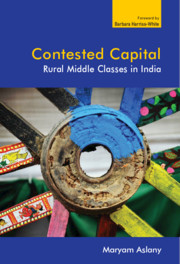
- Cited by 5
-
Cited byCrossref Citations
This Book has been cited by the following publications. This list is generated based on data provided by Crossref.
Kalaiyarasan A. and Vijayabaskar, M. 2021. Why Does the ‘Provincial Propertied Class’ Remain Provincial? Reading the Agrarian Question of Capital Through Caste. Urbanisation, Vol. 6, Issue. 1, p. 16.
Harriss-White, Barbara 2021. Shareholder cities: Land transformations along urban corridors in India. Regional Studies, Vol. 55, Issue. 8, p. 1487.
Harriss-White, Barbara 2021. India’s Non-metropolitan Agrarian Urbanisation and Urban Agrarianisation. Urbanisation, Vol. 6, Issue. 1, p. 104.
Aslany, Maryam and Brincat, Shannon 2021. Class and climate‐change adaptation in rural India: Beyond community‐based adaptation models. Sustainable Development, Vol. 29, Issue. 3, p. 571.
Harriss-White, Barbara 2023. Petty commodity production. The Journal of Peasant Studies, Vol. 50, Issue. 1, p. 295.
- Publisher:
- Cambridge University Press
- Online publication date:
- May 2020
- Print publication year:
- 2020
- Online ISBN:
- 9781108864527




